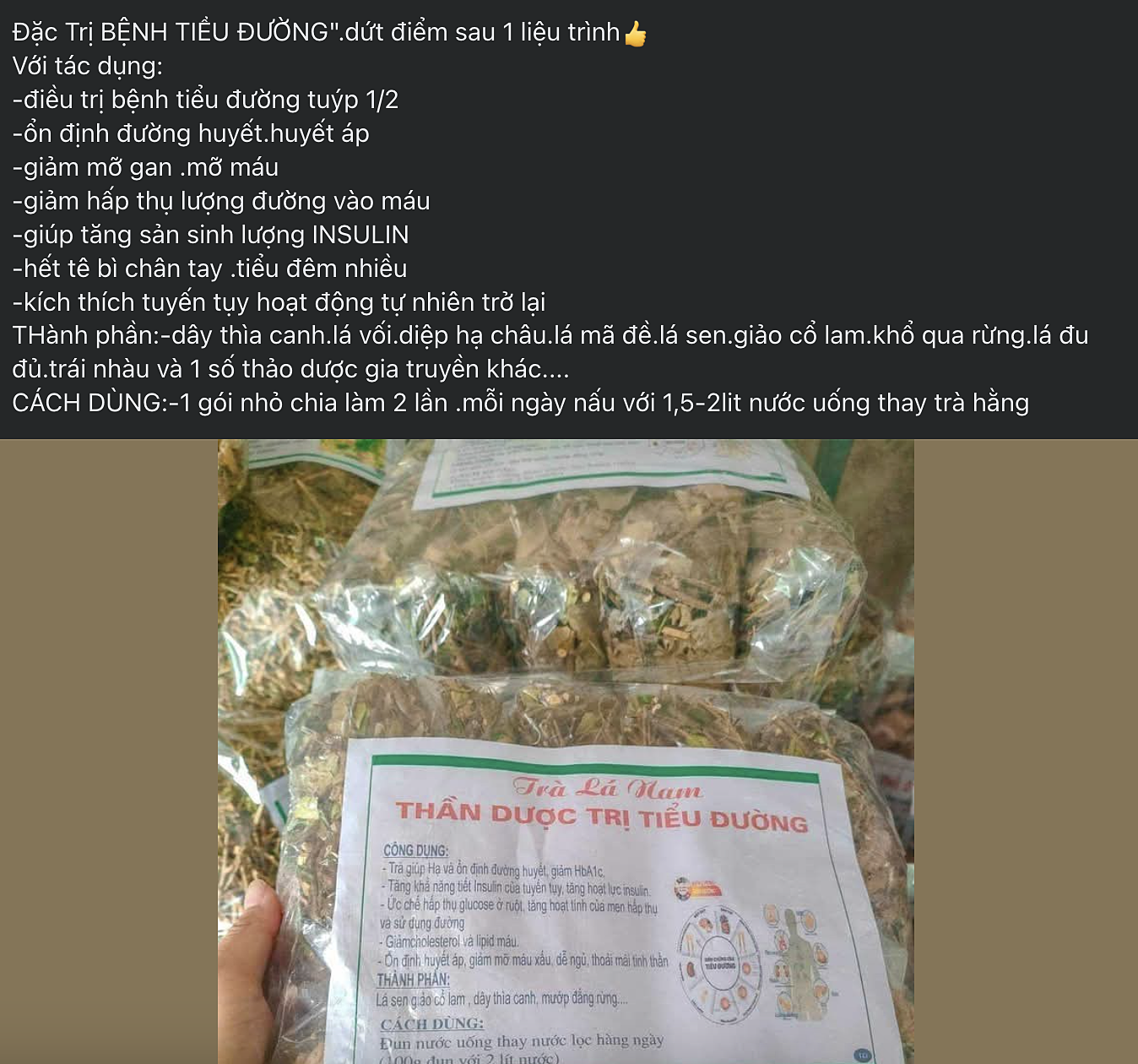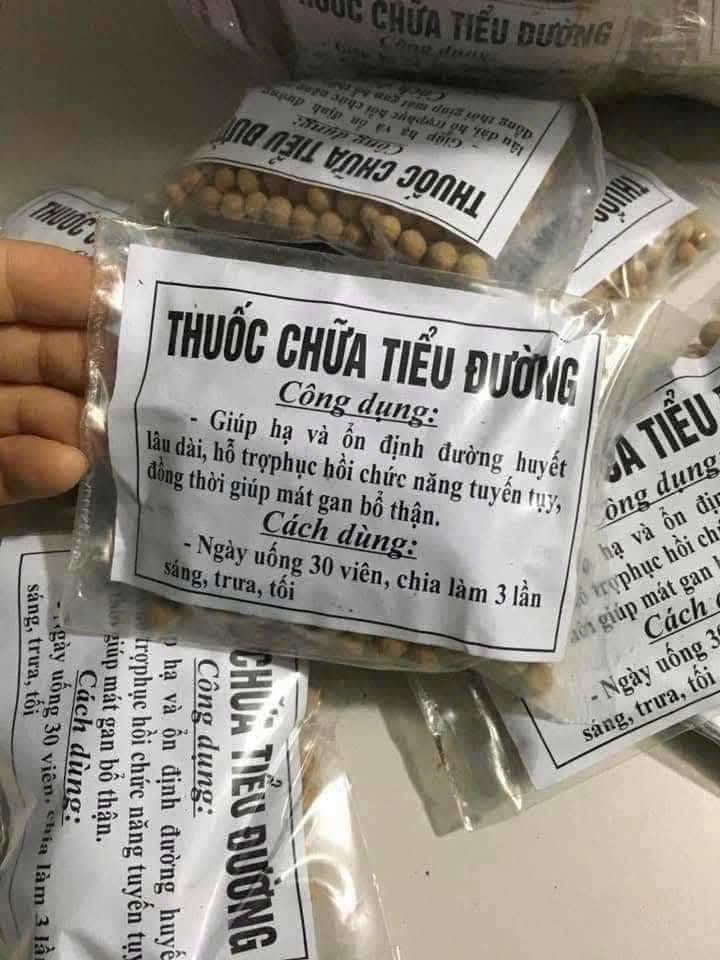In June, a patient was admitted to Hospital 115 in Ho Chi Minh City in a lethargic state, unresponsive, and with low blood pressure. Tests revealed severe blood acidosis and kidney damage. Doctors had to intubate him, put him on a ventilator, and provide continuous dialysis to save his life.
According to his family, he had purchased unlabeled medication from Ben Tre. Testing revealed the medication contained phenformin, a drug banned in Vietnam and globally since the 1970s.
In a similar case, a 54-year-old woman was admitted to Thong Nhat Hospital for lethargy and abdominal pain after taking pills advertised as a "3-generation traditional diabetes cure." Tests confirmed the pills contained phenformin, and the patient suffered severe metabolic acidosis, a potentially fatal complication.
After three days of intensive care and dialysis, her condition improved. Her family stated she had taken pills from an unlabeled plastic bag of unknown origin.
In Hanoi, a 67-year-old man fell into a coma after taking diabetes medicine bought online. Hospital 198 sent the medicine to the National Institute of Forensic Medicine, where tests revealed it contained toxins.
The patient had a history of hypertension and diabetes. Previously, he took prescribed medication. For the past three months, he had been using a "traditional cure" advertised online. Doctors put him on a ventilator, administered high doses of vasopressors, and performed continuous dialysis. After 48 hours, he recovered.
These are just three of many cases requiring emergency treatment due to unregulated diabetes medications containing banned substances.
 |
An online advertisement for "traditional" diabetes medicine. Screenshot |
An online advertisement for "traditional" diabetes medicine. Screenshot
Doctor Duong Minh Tuan, from the Endocrinology-Diabetes Department at Bach Mai Hospital, says diabetes medication poisoning is common. Major hospitals admit many such cases annually, some of which are fatal due to late admission.
According to the Lancet, the global diabetes prevalence has doubled from 7% to 14% in three decades, affecting over 800 million people. Vietnam has approximately 7 million diabetics, over half of whom have cardiovascular, eye, nerve, or kidney complications. The incidence rate in the 20-79 age group has tripled since 2000. Alarmingly, about 50% of cases go undiagnosed due to lack of awareness or negligence. This has fueled the growth of the online diabetes medication market, which carries significant risks.
Doctor Ngo Thi Kim Oanh from Ho Chi Minh City University of Medicine and Pharmacy Hospital warns against products marketed as "traditional medicine" that are often handmade, poorly packaged, untested, and unregistered with the Ministry of Health.
A VnExpress survey reveals the ease of purchasing diabetes medication online. Searching for "buy diabetes medicine" yields hundreds of thousands of results.
Medications are sold in various forms: powders, leaves, and pills, at different prices, with unverifiable origins. Customers simply select the quantity, provide personal information, and choose a payment method to receive the medication within days.
Advertisements often claim: "From natural herbs," "No side effects," "Cured thousands," "Completely cures diabetes." Social media groups like "Diabetes Community" (50,000 members) and "Group sharing experiences of treating diabetes without hospitalization" (250,000 members) are common platforms for such promotions.
These preparations are often concocted by individuals without medical or traditional medicine expertise, based on personal experience. They often mix multiple ingredients in uncontrolled doses, leading to poisoning. Most dangerous are phenformin and glibenclamide, added to rapidly lower blood sugar and deceive patients.
Phenformin, a biguanide similar to metformin but far more toxic, is particularly dangerous. Used in the US since the 1950s, it was banned in 1973 after causing numerous deaths from lactic acidosis.
In Vietnam, phenformin is still illicitly produced and sold online in pill and herbal medicine forms.
Diabetics already face risks of cardiovascular, kidney, and nerve complications. Using medications containing banned substances adds the risk of respiratory failure, hypotension, delirium, and even rapid death. People with liver, kidney, or other chronic diseases face even more severe complications. Initial poisoning symptoms like fatigue, loss of appetite, abdominal pain, or a false sense of improvement can be misleading.
Doctors explain that diabetics, often tired from lifelong treatment, are easily swayed by advertisements for "miracle cures." Many believe herbal remedies are safe for long-term use without medical supervision.
 |
A self-proclaimed "traditional" diabetes medicine advertised online. Screenshot |
A self-proclaimed "traditional" diabetes medicine advertised online. Screenshot
Research by the Institute for Health Policy and Management reveals 73% of Vietnamese use traditional medicine, but only 34% purchase it from reliable sources. Worryingly, 68% believe herbal medicine has "no side effects."
Management efforts are hampered by the dispersed and unregulated nature of most sellers. Endorsements by celebrities, key opinion leaders, and TikTokers further mislead consumers. E-commerce platforms have regulations, but oversight remains lax.
Experts acknowledge the potential benefits of legitimate traditional medicine. Many proven herbal remedies are licensed. However, sellers must understand the ingredients, dosage, and indications.
Those seeking traditional medicine should consult reputable traditional medicine hospitals or clinics, avoiding online purchases or self-proclaimed healers.
Doctor Tuan emphasizes that diabetes is a chronic condition not curable by "secret" pills. Treatment involves a healthy diet, maintaining a healthy weight, regular exercise, and prescribed medication. Using untested products can be life-threatening.
Patients should be wary of online advertisements and adhere to proven treatment plans. Authorities must strengthen oversight and crack down on unregulated diabetes medication sales to prevent tragedies.
My Y












